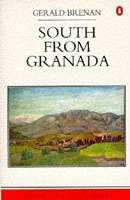South from Granada

Editorial Penguin UK
Fecha de edición julio 1992
Idioma inglés
EAN 9780140167009
320 páginas
Libro
encuadernado en tapa blanda
Resumen del libro
I'd always shied away from Brenan's book because everyone said it was a classic, I'm wary of these as they usually entail a great deal of fine writing' and showing off on the part of the author. I'd also heard that it included accounts by Brenan of visits to his remote Spanish village by Lytton Strachey and Virginia Woolf in the 20s, the whole thing had a slightly fusty Bloomsbury feel about it which scarcely made me want to read it. But, as I was on holiday this summer south of Granada, about twenty miles from Brenan's village in Las Alpujarras, I thought I'd better give it a try. I discovered that I couldn't have been more wrong about the book; it's vigorously written, deeply sympathetic to the local culture without being sentimental and provides a fascinating portrait of the author himself.
Brenan came out of the First World War trenches feeling sick of Western civilization. He sought somewhere remote and unknown where he could hole up and recuperate, and he found the perfect place in the village of Yergan, between Granada and the Mediterranean, in the foothills of the Sierra Nevada mountains. It was then an unimaginably remote place, virtually self-sufficient because of the fertile soil and the waters that came off the mountains. He writes with a clear eye of the villagers' anti-clericalism, their family feuds, their courting rituals and of the two village prostitutes. He also writes of long trips to the coastal town of Almeria and the city of Granada; trips that feel like feats of endurance as they're undertaken by foot or on donkey.
For the modern the book has an almost unbearable sense of poignancy, as it was in Andalucia that some of the most terrible atrocities of the Spanish Civil War were to take place ten or fifteen years later. There is one other curiosity about the book that makes it intriguing. Just a few miles west along the valley lies the village where Chris Stewart farms today. Compare and contrast his account in Driving over Lemons of an Englishmen in Las Alpujarras in the 90s with Brenan's stay there 60 or 70 years earlier.
Biografía del autor
Gerald Brenan (1894-1987), autor de obras fundamentales para entender la España contemporánea, desde las penumbras rurales hasta el advenimiento de la democracia, como El laberinto español, La literatura del pueblo español, La faz de España y Al sur de Granada, es considerado el hispanista más reconocido por su caleidoscópico y original enfoque hacia nuestro país. Su vida, marcada por un espíritu erudito y bohemio, osciló precisamente entre dos mundos en contraste: la rígida y clasista Inglaterra de principios del siglo XX, de la que huyó tras combatir en la Primera Guerra Mundial, y su descubrimiento de España, en especial Andalucía, que se convertiría en su refugio y tierra de adopción. Este encuentro le permitió desarrollar una visión única sobre la cultura, historia y sociedad españolas.








